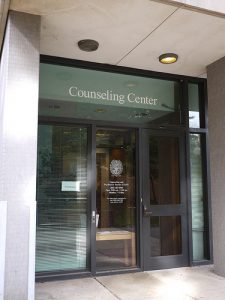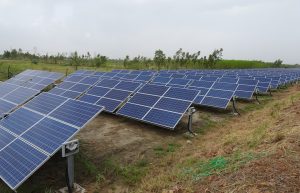The Office of Sustainability (OoS) is currently functionally on pause.
Normally run by two full-time staff and a team of three to five interns, the office has been a pillar of the Georgetown environmental community since it was founded in 2013. The departure and movement of the office’s permanent staff, however, leaves the office waiting for direction.
Audrey Stewart, who has led the office as its director since its founding, left the university at the end of January to spend more time with her young son, according to a statement she sent to the Voice. The other full-time staff member, Giulia Manno, was redeployed to work on the university’s COVID-19 response through the highly-criticized Redeploy Georgetown program, according to the office’s website, leaving the office with no staff for the semester. However, at the same time the office’s lights are off, the university has signaled it will be increasing its future importance by hiring for a new position, the vice president of sustainability.
OoS serves as a hub for sustainability programs, uniting efforts across departments to decrease the university’s environmental footprint. The office has aided the university in developing its waste and recycling programs and was working on a long-term sustainability plan for the university. “It’s first and foremost is looking at the sustainability of the campus as a whole,” Olivia Torbert (SFS ‘20), a former intern in the office said.
Though temporary, the essential halting of the office’s activities is concerning some members of the environmental community at Georgetown, especially since student leaders were originally provided little information about a replacement for Stewart. Victoria Boatwright (COL ‘22), the vice president of GREEN, Georgetown’s environmental student club, learned about Stewart’s incoming departure at a meeting before the semester began, and immediately became worried about the implications if the office, which provides institutional support to GREEN, would be non-operational for the upcoming semester.
“The Office of Sustainability is really important for long term planning and for coordinating with different departments and ensuring sustainability is part of everything we do,” Boatwright said, adding that at a university with so many departments, “members of Georgetown university staff who are actively supporting sustainability across all realms of Georgetown needs to be a position.”
According to a university spokesperson, Georgetown agrees with the importance of supporting and continuing the office’s mission. To that end, they are planning to hire a vice president of sustainability, a position that would theoretically hold more power than the position Stewart vacated. While the search for the new vice president is underway, Lisa Belokur, the associate vice president of facilities operations, will serve as the leader of the office in addition to her other duties overseeing maintenance and custodial services.
“While Audrey Stewart is no longer with Georgetown, the work of the Office of Sustainability continues,” the spokesperson wrote in an email to the Voice. “Georgetown University is committed to engaging the complex issues of sustainability to advance the common good for current and future generations.”
While Boatwright was encouraged by the creation of the position, she is concerned that the creation of the position had not been publicized to GREEN and students were not involved in the process.
“I am hopeful that the University will provide GREEN and other students engaged in sustainability not only direct contact with this new position, but also collaborate with students through the hiring process,” she wrote in an email to the Voice.
Students’ desire to be involved in environmental efforts at Georgetown is not new. Boatwright pointed to her experience with GU Fossil Free pushing for the university to divest as an example of students not being brought fully into the process. While Boatwright feels this disconnect is still a problem, and acknowledged sometimes even the OoS did not fully read them into policy changes, the sustainability staff were a reliable bridge between groups like GREEN and university administrators.
“This is kinda the group that helps us get administrative cooperation, that helps us pitch things.,” Boatwright said, adding that both Stewart and Manno serve as unofficial club advisors in addition to their role in the office. “One of our biggest links to the university administration has kind of evaporated, hopefully for a short time,” Boatwright said.
Since the OoS is an official university office, its full-time employees have connections to the chief operating officer and university president that student groups just can’t access. According to Boatwright, Stewart and Manno could forward proposals from GREEN up to decision-makers in higher offices, which led to increased student involvement, such as students being invited to roundtables before the announcement of Georgetown’s new power purchasing agreement.
“I think it’s really really important to have students at the table for things like that,” Boatwright said. “We are large stakeholders, and we have pretty important perspectives.”
Students are also crucial to the office through interns like Torbert. She first connected to the OoS when she was working on a project to revamp the university’s recycling system, and they ended up hiring her as an intern. In that position, she helped develop a sustainability pilot program for department offices, organized an Earth month celebration in April, and implemented a composting program in Leo’s. While she understands why the university decided to scale back the office this semester, she hopes the office comes back in full force.
“I wanna give the university a little bit of grace on this because I know they’re going through so much right now with COVID,” Torbert said. “But I really hope that not only for Georgetown’s continued efforts towards sustainability but also to give opportunities to students on campus to engage with sustainability or environmental activism the office opens again next semester.”
With the office put on pause, Boatwright’s main concern is how to ensure students remain involved in sustainability decisions this upcoming semester without the connections the OoS provided. Though GREEN is hoping to work with the Georgetown Environment Initiative (GEI) and faculty, these aren’t exact substitutes. GEI focuses more on majors and academic studies than university operation plans, for instance. Additionally, the perspective provided by student interns who are normally involved in day to day operations at the office has been lost, first through layoffs at the start of COVID-19, and now through the inactivity of the office.
Still, Boatwright said GREEN is trying to make the best of the situation—including thinking about how a restructuring of the OoS could give it more influence on campus. Members of GREEN have begun researching how similar offices fit into other university structures to see if the OoS could benefit from being moved from under the umbrella of facilities.
“Let’s see this as an opportunity and how we can really pressure the university to kind of change the structure of the Office of Sustainability to give them more power, or even if them being in facilities is actually the best place, if we can kind of put them higher up somehow,” Boatwright said. She added GREEN would be encouraging the university to hire new staff soon, arguing that a commitment to hiring someone was not the same as having someone to actually fill the position.
The new position announced by the university is a promising sign of the office’s future, especially once someone is hired. But Boatwright is hoping for more than just a new leadership position—she wants more staff in general and a seat at the table with them. Torbert, meanwhile, is hopeful this semester is just a hitch in a road that has largely been taking Georgetown in a sustainable direction, recently exemplified by the successes of the GEI and pushes for an environmental studies major.
“I really hope that Georgetown continues to go in the way that they seem to be going with their momentum and creating more opportunities for students to get involved in this field,” she said.
“I’m like optimistic with where Georgetown’s going, to be totally honest, which is really nice to feel.”





